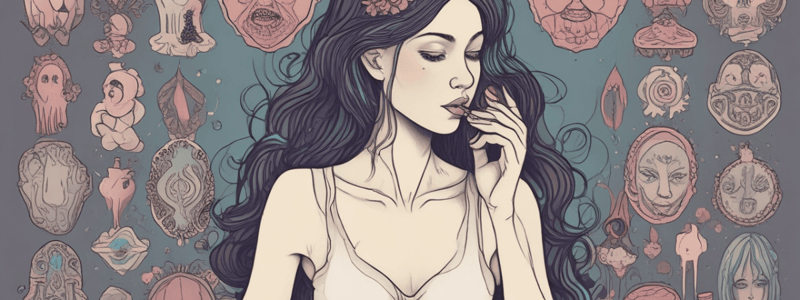Podcast
Questions and Answers
What is the primary difference between disordered eating and an eating disorder?
What is the primary difference between disordered eating and an eating disorder?
- Disordered eating involves occasional unhealthy eating habits, while an eating disorder is a diagnosable condition. (correct)
- Disordered eating is a regulated behavior, while eating disorders are not.
- Disordered eating is always healthy, while eating disorders are not.
- Disordered eating requires hospitalization, while eating disorders do not.
How is orthorexia different from healthy eating?
How is orthorexia different from healthy eating?
- Orthorexia involves an obsessive focus on eating only food one perceives to be healthy. (correct)
- Orthorexia encourages balanced diets, while healthy eating restricts food groups.
- Orthorexia includes regular consumption of junk food.
- Orthorexia does not focus on eating habits at all.
What kind of eating behavior is characteristic of anorexia nervosa?
What kind of eating behavior is characteristic of anorexia nervosa?
- Extreme restriction of food intake and an intense fear of gaining weight (correct)
- Consuming only liquid diets
- Binge eating followed by purging
- Excessive intake of high-calorie foods
What are the health consequences of eating disorders?
What are the health consequences of eating disorders?
Which of the following is a common reason why an individual might choose to starve themselves?
Which of the following is a common reason why an individual might choose to starve themselves?
Which of these is an example of disordered eating reflecting an unhealthy relationship with body image and food?
Which of these is an example of disordered eating reflecting an unhealthy relationship with body image and food?
How are eating disorders similar to other mental illnesses like anxiety disorders or obsessive-compulsive disorder?
How are eating disorders similar to other mental illnesses like anxiety disorders or obsessive-compulsive disorder?
Why do eating disorders rarely resolve without professional treatment?
Why do eating disorders rarely resolve without professional treatment?
Which of the following is often more effective in treating an eating disorder than individual therapy?
Which of the following is often more effective in treating an eating disorder than individual therapy?
What is a key characteristic of disordered eating?
What is a key characteristic of disordered eating?
Flashcards are hidden until you start studying
Study Notes
Disordered Eating and Eating Disorders
Difference between Disordered Eating and Eating Disorder
- Disordered eating refers to irregular eating habits that can develop into an eating disorder
- Eating disorder is a mental illness that causes major disturbances in eating behaviors
Examples of Disordered Eating
- Obsessively counting calories
- Frequently dieting
- Classifying foods as "good" or "bad"
- Feeling shame or guilt about eating
- Being preoccupied with weight, food, or appearance
- Overeating when bored or anxious
- Orthorexia (an obsession with healthy eating that leads to negative health consequences)
Eating Disorders
- Associated with multiple types of behaviors and high frequency
- Can disrupt normal functioning in some way
- Include anorexia nervosa, avoidant-restrictive food intake disorder (ARFID), bulimia nervosa, and binge-eating disorder
Risk Factors for Eating Disorders
- Physical factors: having a close relative with an eating disorder, having a close relative with another mental illness, and having a history of dieting or restricting calories
- Mental factors: having an anxiety disorder, being depressed, and being a perfectionist
- Social factors: media images, societal and family expectations, lack of respect for diversity, teasing, social isolation, and a history of trauma
Health Effects of Eating Disorders
- Cardiovascular system: heart damage, heart failure, and death
- Digestive system: stomach pain, nausea, vomiting, constipation, and fecal incontinence
- Nervous system: cramps, headaches, fainting, and dizziness, menstrual irregularities
- Other effects: low basal metabolic rate, immune system weakening, anemia, kidney failure, and death
Treating Eating Disorders and Disordered Eating
- Requires a multidisciplinary team of professionals, including a therapist, doctor, dietitian, and sometimes a psychiatrist
- Involves addressing mental and physical effects of eating disorders
- Warning signs include fluctuations in weight, digestive conditions, lack of menstruation, and extreme concern about appearance
Warning Signs of Eating Disorders
- Fluctuations in weight
- Digestive conditions
- Lack of menstruation in females
- Dizziness, fainting, and weakness
- Feeling cold all the time
- Dental issues
- Yellow skin, lanugo, and discolored hands and feet
- Cuts or calluses on top of finger joints
- Impaired immune function and healing
- Fixation on appearance, weight, and food
- Discomfort eating around others
- Lack of interest in previously enjoyed activities
- Extreme concern about appearance
- Extreme mood swings
- Refusing to eat certain foods
- Not eating or eating very small amounts
- Frequent dieting
Therapy for Eating Disorders
- Involves talking with a trusted adult or contacting the National Eating Disorders Association (NEDA) helpline
- Therapists can help people manage eating disorders and disordered eating behaviors
- Types of therapy include individual and family therapy
- Family therapy involves parents or guardians and siblings in treatment
- Therapy can help people create healthier eating behaviors, expand the types of foods they are comfortable eating, and avoid linking their self-esteem with their weight and appearance
Studying That Suits You
Use AI to generate personalized quizzes and flashcards to suit your learning preferences.




